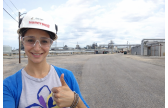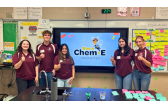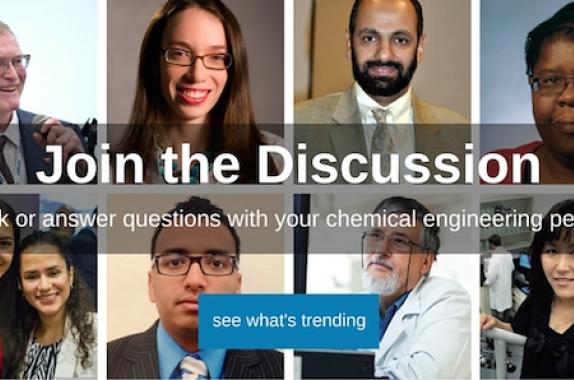
Pictured above: University of Massachusetts Lowell (UMass Lowell) students who completed summer co-op programs at leading companies, including Pfizer, Lantheus, Johnson & Johnson MedTech, IDEMIA, Vicor Corporation, ASMPT NEXX, E Ink, and Oak Ridge National Labs.
As industries evolve to meet new challenges, from sustainability demands to the rapid pace of digital transformation, the skills chemical engineers need to succeed are shifting just as quickly. Many in academia and industry agree that experiential learning, particularly co-op programs, can play a critical role in bridging the gap between classroom theory and the realities of professional practice.
This year’s AIChE Annual Meeting, taking place November 2–6 in Boston, MA, will feature a session exploring how experiential learning can better prepare chemical engineering students for the workforce and address emerging industry needs.
We spoke with Annual Meeting Program Chairs Nese Orbey, Associate Professor and Associate Chair for Undergraduate Studies at the University of Massachusetts Lowell, and Chris Lowe, Senior Staff Engineer at Takeda Pharmaceuticals, about their featured session, Chemical Engineering Education – Experiential Learning. They discuss what inspired the session, how co-op programs enhance student development, the challenges to implementing them, and how industry and academia can work together to shape the future of chemical engineering education.
What inspired the focus on experiential learning for this year's featured session? And how does experiential learning help bridge the gap between classroom education and today’s rapidly evolving workplace demands?
Nese: This is a topic that fits well with the theme of the Annual Meeting, “Chemical Engineering Reimagined,” and aligns with Boston’s reputation as an educational hub. The new generation of chemical engineers will work in a wider variety of industries, including biopharma, clean energy, semiconductors, and nanotechnology. They will also be increasingly focused on renewable and sustainable technologies due to global challenges and will play a vital role in lifecycle assessment (LCA) of processes. Experiential learning, and more specifically co-op experience, enables students to connect what they learn from textbooks with real-life applications in an industrial setting and helps them gain a more holistic understanding of process development and implementation.
Chris: There have been many discussions around a potential shortage of engineers in the coming years. If that is true, it’s critically important that we train and prepare emerging engineers as best we can. Traditional teaching methods can help build the engineering fundamentals students need, but hands-on, on-the-job learning is extremely impactful in helping engineers apply those fundamentals. Being able to see and, even more importantly, work with equipment and concepts that were previously only in a textbook or lecture slide allows students to start transforming into professionals. Experiencing this while still a student can greatly amplify their career growth.
Co-op programs are a key part of this conversation. How do they enhance a student’s education and better prepare them for the workforce, compared to traditional classroom learning alone?
Nese: Co-op experiences provide students with real-world exposure where they can see the applications of what they learned in the classroom. Physical phenomena discussed in core courses are not always intuitive. Lab courses partially address this, but the co-op experience offers extended exposure in an actual manufacturing setting.
Co-op experiences also prepare students for post-graduation job applications. They learn interview skills and how to write their resumes. They also gain business perspectives, learning about organizational structure, work discipline, and networking. Co-ops are a good resume builder, and often students land a job with the companies where they completed their co-op.
Chris: Co-op experiences offer an extended opportunity to work in an industrial setting, usually around six months. Compared to a traditional summer internship, this allows for longer-term projects, more meaningful contributions, and deeper learning experiences.
What are the biggest challenges to implementing experiential learning, and how can universities and industry work together to overcome them?
Nese: The perceived challenge is whether a co-op experience will delay graduation and whether this delay is worth it. At UMass Lowell, students can do six-month or nine-month co-ops. For the former, graduation in four years is possible because courses are offered in multiple semesters. In the future, online classes will be offered more widely, which may help with scheduling.
Another challenge is how to make the co-op experience more consistent across industries, in terms of workload and responsibilities for participating students.
Chris: The biggest obstacle is timing; it takes a substantial commitment to fit a co-op into a traditional ChemE curriculum. A six-month co-op usually means taking a semester away from campus and coursework. Some universities make this easy by offering required courses multiple times throughout the year, but in other cases, missing one semester can mean a student needs an additional year if there are year-long capstone courses or if certain required courses are only offered once per year. Adding flexibility to the academic curricula to make co-ops more accessible would be very helpful.
What do you hope attendees will take away from this session, and how do you see experiential learning shaping the future of chemical engineering education?
Nese: The session brings together faculty from universities with established co-op programs, industry leaders who have worked extensively with co-op students, and a student who has co-op experience. I think the takeaway will not be whether a co-op program is beneficial, but rather how to streamline it, how to better prepare students for a co-op experience based on industry needs, and how to encourage students to make co-ops part of their education plans.
Chris: I hope that people walk away with a new appreciation for the value of co-ops and other longer-term experiential learning opportunities. On the academic side, I hope we can work to reduce perceived barriers for students to participate in co-ops, encourage industry to create more co-op positions, and collectively, as a community, inspire students to integrate co-ops into their development plans.

Nese Orbey
Nese Orbey is an Associate Professor of Chemical Engineering at University of Massachusetts Lowell. Her area of expertise includes advanced polymeric materials, polymer rheology, nanocomposites and structure-property relations. Read more.

Christopher Lowe
Chris Lowe is a Senior Staff Engineer at Takeda Pharmaceuticals. He earned B.S. degrees in Chemical Engineering and Biochemistry & Molecular Biology from the University of Massachusetts Amherst and completed his Ph.D. in Biomedical Engineering at Rutgers University. Read more.
Learn more about the 2025 AIChE Annual Meeting
Join the conversation on LinkedIn and Twitter | #AIChEAnnual







